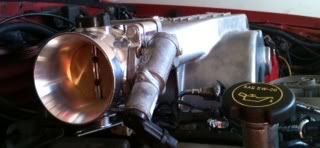what is the difference in SAE30 and 10w30?
Announcement
Collapse
No announcement yet.
differences in oil
Collapse
X
-
somewhat false.Originally posted by The King View PostSAE30 is straight 30-weight motor oil and 10w30 is a blend of 10-weight and 30-weight.
10w 30 means its 10 weight when its cold and 30 weight when the engine is at normal operating temperatures.
the W stands for winter.
For new engines, im not for sure which is best, but i wouldn't go with a straight 30 weight, i broke my honda engine in using 5w30 Valvoline, changed 500 miles, and then 1500 miles and 3000 miles to be sure i had fresh oil during the break in period.
If youre making a lot of power, a thicker oil would be better, and i base this off of a Ford GT with 1500hp used 5w50. More cushion for that piston Pushin..
320rwhp. 7.67 @ 90mph 1.7 60'
DD: 2004 GMC Sierra VHO 6.0 LQ9 324whp 350wtrq
Comment
-
Check the data sheets here: http://www.bobistheoilguy.com/aehaas/oildatasheets.html
The difference is just in how the oil viscosity is rated... the operating ranges are different. If you had an engine built, your builder should recommend the correct oil. If it is a new car then you should go by whatever the owner's manual says. This is not the area where you want to experiment.
Comment
-
No. None of this is right.Originally posted by 91CoupeMike View Postsomewhat false.
10w 30 means its 10 weight when its cold and 30 weight when the engine is at normal operating temperatures.
the W stands for winter.
For new engines, im not for sure which is best, but i wouldn't go with a straight 30 weight, i broke my honda engine in using 5w30 Valvoline, changed 500 miles, and then 1500 miles and 3000 miles to be sure i had fresh oil during the break in period.
If youre making a lot of power, a thicker oil would be better, and i base this off of a Ford GT with 1500hp used 5w50. More cushion for that piston Pushin..
Comment
-
Actually some of it is. The w does stand for winter not weight like some think. 10winter30 means its a lighter viscosity oil in certain temperatures to make it easier for the motor to pick up the oil when its cold, as the engine temp rises and tolernces change the viscosity gets heavier or thicker to act as a cushion , cleaner, and a lubricant etc. 30 weight oil sticks to things bettter than and a lighter thinner 5 or 10 weight oil. I'm sure there is much more to it but this is about it in simple terms.
I break older engines in with RotellaT 15-40 but for new cars just go with manufacturer recomended oil.89 dove grey lx, turbo blowthrough
Comment
-
I'm amazed at how misunderstood oil viscosity is. Engine oil is "thicker", ie higher viscosity, at lower temperatures and "thinner" at higher temps. Almost every fluid in this world acts the same way.
Good God, Ubil (aka 360 Notch) is probably rolling in his grave right now.Last edited by TENGRAM; 05-13-2011, 01:44 AM.
Comment
-
No, that's not how that works. Oil is different.Originally posted by TENGRAM View PostI'm amazed at how misunderstood oil viscosity is. Engine oil is "thicker", ie higher viscosity, at lower temperatures and "thinner" at higher temps. Almost every fluid in this world acts the same way.
Good God, Ubil (aka 360 Notch) is probably rolling in his grave right now.
320rwhp. 7.67 @ 90mph 1.7 60'
DD: 2004 GMC Sierra VHO 6.0 LQ9 324whp 350wtrq
Comment
-
Tengram is right on all accounts and I would trust his knowledge and Grapes before I would the newbs...Originally posted by SilverbackLook all you want, she can't find anyone else who treats her as bad as I do, and I keep her self esteem so low, she wouldn't think twice about going anywhere else.
Comment
-
10W-30 means it is a 10 weight motor oil PERIOD! W is the winter or cold pourability.
the end number 30 means the oil will thin down an equal to what a 30 weight would thin down at operating temps.
If a straight 30 weight oil thins down say 4 viscosity points then your 10 weight is now 6.
Oil doesn't thicken up when hot!
Comment

Comment